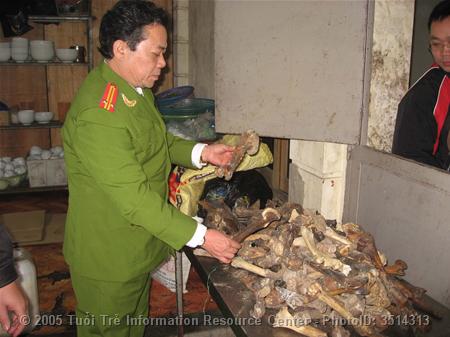A short film which promotes against the rampant use of tiger bone glue among locals is set to be aired on television later this month in an attempt to curb the killing of tigers and safeguard the animal from extinction.
The film, “Su dung cao ho khong lam ban an tuong hon” (Use of tiger bone glue don’t help you impress others), (http://thiennhien.org/), launched by the Nature Education Center, is designed to raise awareness among locals about the conservation of the tiger and urge them to say no to the tiger bone glue, as “When the buying stops, the killing can too.”
The film also criticizes the outdated opinion held by a number of people that the glue isn’t only a miracle remedy but is also a way to show off their success or social position.
The film revolves around a young man who is recently promoted to the management board of a company. To impress his superiors, he gifts them with the tiger bone glue during their first meeting. However, his gift fails to impress as expected, it even arouses antipathy among several board members.
The filmmakers also urge locals to report violations on the tiger to concerned agencies or call 1800 1522 toll-free.
The film is set to air on national and provincial televisions later this month.
A large number of Vietnamese people, particularly males, remain under the misconception that tiger glue paste is a miracle drug which can cure bone illnesses and improve physical health and sexual vigor.
The glue is typically used as gifts among businessmen, officials and the rich, especially during Tet (lunar New Year).
Over recent decades, the tiger population in Vietnam has dropped considerably, mostly due to poaching, illegal trading and shrinkage of the animal’s natural habitat.
Economic strides and locals’ raised living standards have caused demands for the glue to surge.
According to statistics by international conservation centers, Vietnam has only some 30 tigers left in the wild. Vietnamese tigers are likely to face extinction just as one-horned rhinos, which were announced extinct by the country in 2010.


















































